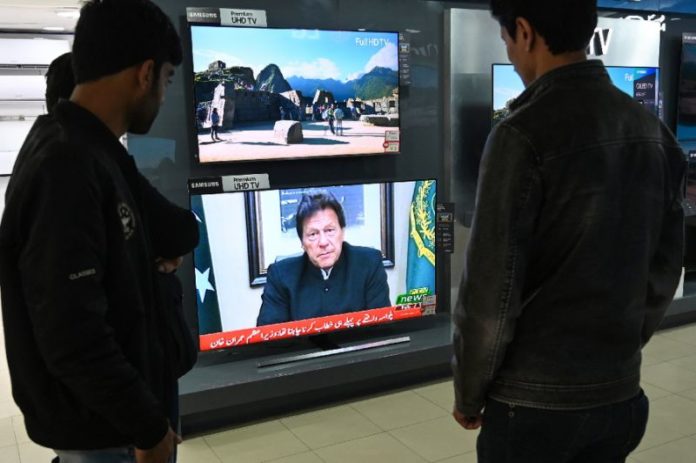ISLAMABAD, Feb 19, 2019 (BSS/AFP) – Pakistan is ready to help India
investigate the deadliest blast in Kashmir in decades, but will retaliate if
Delhi attacks, Prime Minister Imran Khan said Tuesday as tensions between the
nuclear-armed rivals soared.
Khan used a nationally televised address to demand Delhi share proof of
Islamabad’s alleged involvement in last week’s suicide blast, which killed 41
people in Indian-held Kashmir and unleashed a fresh diplomatic crisis over
the disputed Himalayan region.
The attack, which has triggered nationwide anger in India, was claimed by
Pakistan-based militant group Jaish-e-Mohammed.
Indian officials have said those behind the blast will pay a “heavy
price”. The Indian military also said Tuesday the bombing had been
“masterminded” by Pakistan, and specifically its powerful Inter-Services
Intelligence branch.
If India attacks, “Pakistan won’t just think to retaliate. Pakistan will
retaliate,” said Khan in the address.
Islamabad has denied involvement. “If you have some actionable
intelligence about involvement of Pakistanis, give it to us, I guarantee you
that we will take action,” Khan said Tuesday, adding that Pakistan was “ready
to talk” about terrorism with India.
It was “easy to start a war”, he said, adding that he hopes “better sense
will prevail”.
Kashmir has been split between India and Pakistan since independence from
Britain in 1947. Both countries claim the Himalayan territory in full and
have fought two wars in connection to the dispute.
India has long accused Pakistan of harbouring militants that launch
attacks on its soil, including banned groups such as JeM and Lashkar-e-Taiba,
blamed for carrying out the 2008 Mumbai attacks which left scores dead.
Islamabad has repeatedly vowed to crack down on the groups if Delhi
provides evidence of involvement.
Khan said on Tuesday that if any militant group was using Pakistani soil
to launch attacks, “its enmity is with us. This is against our interest”.
Pakistan was also accused by Iran last week of sheltering the perpetrators
of an attack which killed 27 Revolutionary Guards, while Kabul and Washington
have long claimed that Islamabad offers safe haven to the Afghan Taliban.
– ‘Defuse tensions’ –
With anger building in India, Prime Minister Narendra Modi faces increased
pressure to act as his Hindu nationalist government is expected to call a
national election within weeks.
Indian forces have staged operations since Thursday’s attack while anti-
Pakistan and anti-Kashmir sentiment has spread across the country, fuelled by
social media including widely shared false news reports.
On Tuesday the Indian army said three JeM militants were killed in a gun
battle a day earlier.
Two of them were Pakistanis, including the group’s “chief operations
commander in Kashmir”, Lieutenant General Kanwal Jeet Singh Dhillon told a
press conference in Srinagar.
The Indian government has already withdrawn trade privileges for Pakistan,
ended police protection for four Kashmiri separatist leaders, and halted some
cross-border services.
Earlier Tuesday, Pakistani Foreign Minister Shah Mahmood Qureshi pleaded
with UN Secretary General Antonio Guterres to intervene in the escalating
row.
“The United Nations must step in to defuse tensions,” wrote Qureshi in a
message shared with journalists.
UN rights commissioner Michelle Bachelet released a statement saying she
hoped the intensifying dispute “will not add further to the insecurity in the
region”.
On Monday Saudi Arabia vowed to “de-escalate” the situation during a high-
profile state visit by Crown Prince Mohammed bin Salman to Islamabad. He is
also due in India this week.
Kashmir is one of the world’s most militarised zones, with some 500,000
Indian troops deployed to fight a rebellion that broke out in 1989.
Scores of armed groups are now involved.
Tens of thousands of people, mainly civilians, have died in the conflict.
Violence has spiked since 2016 with almost 600 killed last year, the highest
toll in a decade.



